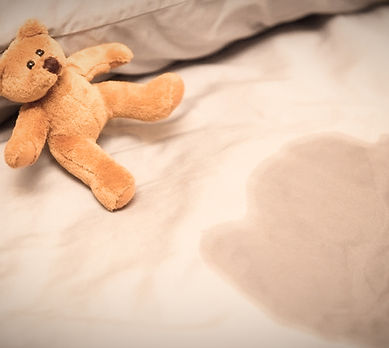

INTERNATIONAL PLATFORM FOR DEVELOPMENT

DEFINITION OF ENURESIS
Enuresis, also known as nocturnal urinary incontinence, is a condition in which a child over the age of five repeatedly fails to control urination during sleep.
Enuresis is defined as involuntary urination during sleep in a child aged five or older, occurring at least twice a week for a period of at least three consecutive months, in the absence of any underlying medical issue.
Probable Causes:
-
Delayed bladder development:
-
Some children may take longer to develop the ability to control their bladder during the night. The wake-up mechanisms in response to a full bladder may be delayed, leading to enuresis.
-
-
Genetic factors:
-
There is often a genetic component to enuresis. If the parents experienced nocturnal enuresis as children, it is more likely that their child will also be affected.
-
-
Excessive nighttime urine production:
-
Some children produce more urine at night than their bladder can hold, which can lead to leakage.
-
-
Psychological or emotional difficulties:
-
Psychological factors such as stress, anxiety, major changes in the child's life, family problems, or conflicts can contribute to enuresis. In some cases, enuresis may be a reaction to past traumas.
-
-
Sleep disorders:
-
Some children with sleep disorders, such as sleep apnea, may also exhibit enuresis.
-
It is important to note that each child is unique, and the causes of enuresis can vary from one individual to another. If you believe your child is experiencing enuresis, it is recommended to consult a healthcare professional, such as a pediatrician, who can assess your child's specific situation and recommend appropriate treatment. If the cause is related to sleep disorders or psychological or emotional difficulties, you are in the right place.
Our support techniques will allow you to:
-
To identify emotional blockages related to enuresis.
-
To discover and understand how to modify behaviors associated with nighttime enuresis.
-
To understand how limiting perceptions and emotions around bladder control are formed.
-
To find the keys to improving the child's quality of life.
-
To change negative thought patterns related to enuresis.
-
To eliminate behaviors and anxious associations with falling asleep or sleeping.
Your behaviors and limitations are merely the expression of your internal concerns.
Identify your Enneagram profile and your emotional wounds in order to move forward.
Is it something else? You wish to make a change in your behaviors.
Modify the perception and feeling of your emotions then click on My Needs.